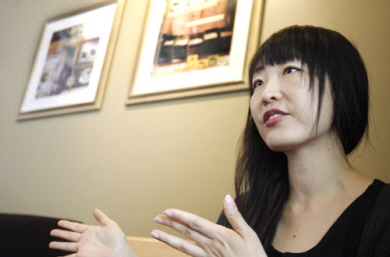
Bae explained that the events held at PEN were very different from what most people probably expect. They are known to be unique and very entertaining, unlike the traditional ones where authors just read their work.
“One of the readings that I participated in was organized like an audition program,” she said.
According to Bae, the reading was held in the form of a competition, setting two authors to read a short passage of their books. The aim was to be the more entertaining, theatrical reader and engaging an audience and a panel of judges. When the author finished his or her piece, the judge’s panel would critique them with a note of humour.
Bae’s literary career started about 20 years ago in her late twenties, when she decided to write a short story out of the blue.
“I was bored,” she said matter-of-factly. “That was it.”
She did not recall any more of the incident that needless to say, became a big part of her life.
A year after she finished her spontaneously written story, she sent it to a magazine, and just like that, in 1993, her first story was published.
According to Bae, she wasn’t ready to be an author when she in fact became one because she had no knowledge or experience in the field beforehand. The writing came about due more to coincidence than anything else.
Since then Bae has become an established author and translator. In 2003 and 2004, her novels The Sukiyaki Restaurant and Solitary Scholar won literary awards. Then in 2008 she began to do German-Korean translations along with her writing.
In more recent years, starting from 2013, Bae’s stories have been translated into English. Currently, her short story Highway with Green Apples has been published in the online literary magazine Day One, and her novel Nowhere to be Found has been translated in English and was published earlier this year.
Bae insisted that luck was behind the secret to her success as an internationally recognized writer. She explained that students at translation institutes usually use short stories to practice their translating, and sometimes send the translated manuscripts to foreign publishing companies for revision and feedback.
“During this process, the editor of AmazonCrossing took a liking to Highway with Green Apples, and she wanted to publish it,” Bae said.
Later, Sarah Jane Gunther, an editor at AmazonCrossing asked Bae to recommend one of her novels she wanted to publish, to which Bae recommended Nowhere to be Found.
“If it wasn’t for this extraordinary coincidence, Nowhere to be Found would never have been translated,” Bae said. “Before publishing the novel, the publisher asked me so many questions as to how well the book was sold in Korea, or what kind of an impact it had, to which I responded that the book did not sell very well and never made any impact.”
Despite her breezy, warm laugh, Bae is known to her readers as a dark writer. People describe her literature as startling and gloomy. Many of her novels, including Nowhere to be Found, have anonymous protagonists and gloomy settings. Circumventing mainstream literature, Bae has gained a reputation for her own unique style, incorporating lots of psychological descriptions.
“My readers are right,” Bae responded. “My novels tend to strike a note of emotional gloom. Many of them are based on a sense of isolation and bleakness that is not always communal.”
She also added that it is difficult to find inspiration from sources outsider herself.
Reflecting on her own writing, Bae smiled mischievously and commented that her stories are very boring. She laughed as she said she could not even bring herself to read such a dull book like her novel North Living Room.
“For this precise reason, I would not want the North Living Room to be translated,” Bae said.
She strongly believes that to translate a piece of writing the translator must have affection and a passion for the story. However, she was skeptical of whether a translator could really have passion for the North Living Room like she did herself.
Speaking as a translator herself, Bae described them as mundane nerds. Her opinion that translators were more conservative and set in their ways made her highly doubtful they could ever build enough zeal for a book so monotonous and vague like the North Living Room.
Bae shared that she was currently busy spending most of her days translating. Believing that a good writer stays sitting for a long period of time, she herself tries to sit for long hours in front of her desk when translating.
“When I write my own novels though, I try not to stay at home,” she said. “I like to travel and find tranquilizing places where I can sit and think and write. Sometimes, my situation does not allow me to travel far, but if I can, I always like to write in a new environment.”
Son Young-chai
squares@ewhain.net

